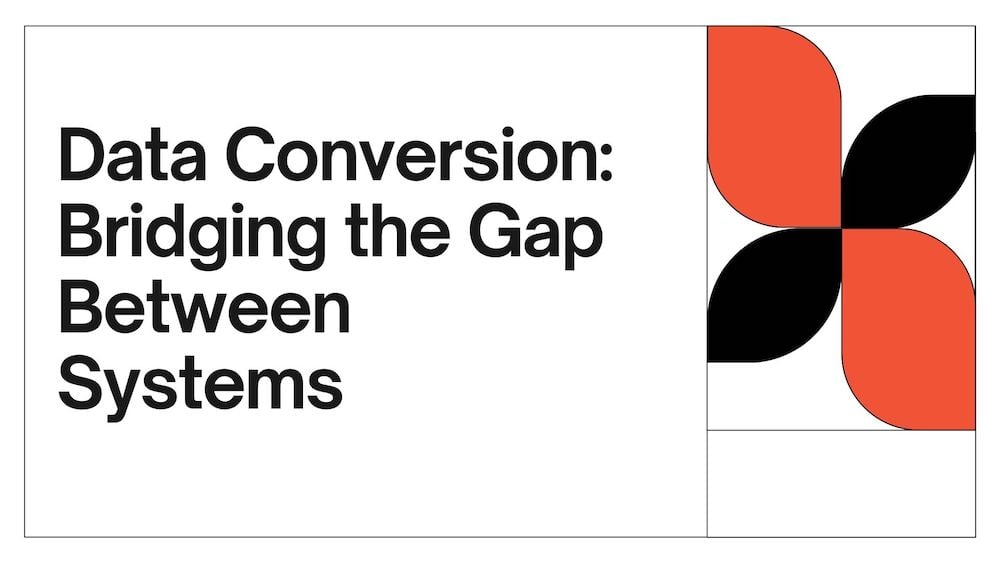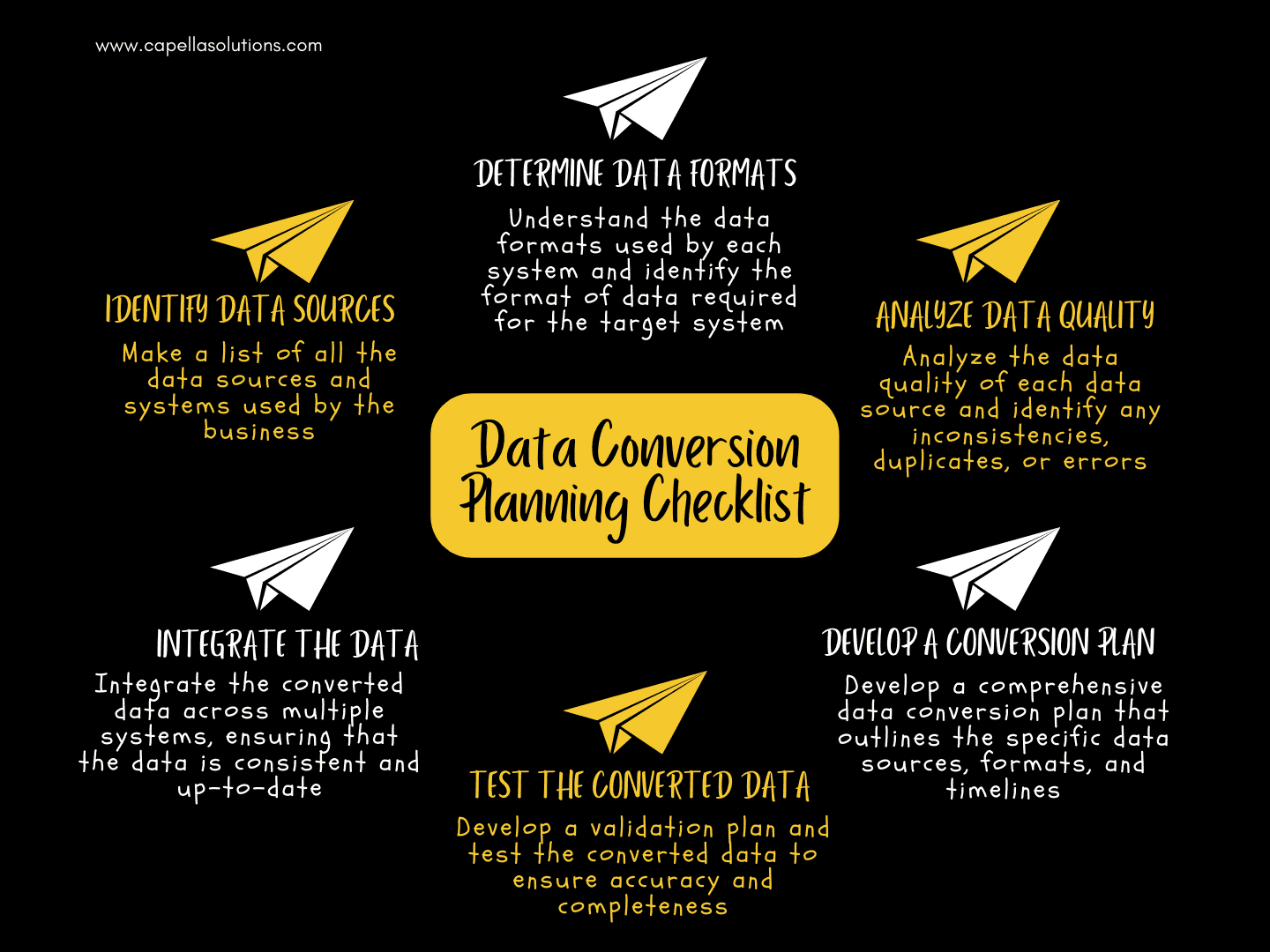
In today's data-driven business world, the importance of data cannot be overstated. Every organization, regardless of its size, relies on data to make informed decisions, improve operations, and gain a competitive edge. However, businesses often face a major challenge when it comes to consolidating their data - disparate systems that don't communicate with each other. This lack of integration leads to inefficiencies, errors, and missed opportunities. That's where data conversion comes in.
At Capella, we understand the importance of having a unified data platform that enables businesses to make the most of their data. We offer a range of data conversion services that help businesses consolidate their data and bridge the gap between systems. Our experienced team of data conversion experts takes a comprehensive approach to data conversion that delivers high-quality results.

In this blog post, we'll take a closer look at the data conversion process, including its challenges, benefits, and tools. We'll also discuss how Capella can help businesses overcome data conversion challenges and consolidate their data to achieve better data quality, increased efficiency, better decision-making, and cost savings. So, whether you're just getting started with data conversion or looking to optimize your existing data conversion process, this blog post has something for everyone.
What is Data Conversion?

Data conversion is the process of transforming data from one format to another. This process is often necessary when companies switch from one system to another or need to integrate data from multiple sources. Data conversion involves extracting data from its original format, transforming it into the desired format, and loading it into the target system.
There are several reasons why companies might need to convert their data, including:
- Mergers and Acquisitions: When companies merge, they often need to consolidate their data from multiple systems.
- System Upgrades: When companies upgrade their systems, they may need to convert their data to the new system's format.
- Data Integration: When companies have multiple systems that don't communicate with each other, they may need to convert their data to a format that can be integrated.
The Challenges of Data Conversion

Data conversion can be a complex and challenging process. Here are some of the most common challenges that companies face:
- Data Quality: The quality of the data can vary between systems, and inconsistencies in the data can cause errors during conversion.
- Data Volume: Converting large volumes of data can be time-consuming and resource-intensive.
- Data Mapping: Mapping the data between systems can be challenging, especially when the systems have different data structures.
- Data Validation: Validating the converted data to ensure accuracy and completeness can be a daunting task.
To overcome these challenges, companies need a robust data conversion strategy and the right tools and expertise.
The Benefits of Data Conversion

While data conversion can be a challenging process, the benefits of consolidating data are numerous. Here are some of the key benefits of data conversion:
- Improved Data Quality: By consolidating data from multiple systems, companies can improve the quality of their data by eliminating duplicates and inconsistencies.
- Increased Efficiency: By having all their data in one place, companies can improve efficiency by reducing the time and effort needed to access and analyze data.
- Better Decision Making: With accurate and consolidated data, companies can make more informed decisions based on a complete picture of their business.
- Cost Savings: By consolidating their data, companies can save on the costs associated with maintaining multiple systems and avoid the potential costs of errors caused by inconsistent data.

How Capella Can Help
At Capella, we understand the challenges that companies face when it comes to data conversion. That's why we offer a comprehensive range of data conversion services designed to help companies consolidate their data and improve their business operations.
Our data conversion services include:
- Data Extraction: We can extract data from a variety of sources, including databases, spreadsheets, and legacy systems.
- Data Transformation: We can transform data into the desired format using industry-standard tools and techniques.
- Data Loading: We can load the converted data into the target system and validate it to ensure accuracy and completeness.
- Data Integration: We can help companies integrate their data across multiple systems, ensuring that their data is consistent and up-to-date.
Our data conversion experts have years of experience working with a variety of systems and data formats. We use industry-standard tools and techniques to ensure the conversion process is accurate, efficient, and cost-effective.
Our Approach
At Capella, we take a comprehensive approach to data conversion that is designed to deliver high-quality results. Here's a closer look at our approach:
Discovery
The first step in our data conversion process is discovery. During this phase, we work closely with our clients to understand their data and business requirements. We conduct a detailed analysis of their systems and data sources to identify any potential challenges or issues.
Planning
Once we have a clear understanding of our client's data and business requirements, we develop a detailed data conversion plan. This plan outlines the specific data sources, formats, and timelines for the conversion process. We work closely with our clients to ensure that the plan meets their business needs and budget.
Extraction
Once the plan is approved, we begin the data extraction process. We use industry-standard tools and techniques to extract data from a variety of sources, including databases, spreadsheets, and legacy systems. We ensure that the data is extracted accurately and efficiently, and we maintain data integrity throughout the process.
Transformation
Once the data is extracted, we begin the transformation process. We use industry-standard tools and techniques to transform the data into the desired format. We ensure that the data is transformed accurately and efficiently, and we maintain data integrity throughout the process.
Loading
Once the data is transformed, we begin the loading process. We use industry-standard tools and techniques to load the data into the target system. We validate the data to ensure accuracy and completeness, and we maintain data integrity throughout the process.
Integration
Once the data is loaded, we begin the integration process. We help our clients integrate their data across multiple systems, ensuring that their data is consistent and up-to-date. We ensure that the integration process is accurate and efficient, and we maintain data integrity throughout the process.
Validation
Once the data conversion process is complete, we conduct a thorough validation to ensure that the converted data is accurate, complete, and consistent. We work closely with our clients to ensure that they are satisfied with the results and that the converted data meets their business needs.
Data conversion is a critical process that helps companies consolidate their data and improve their business operations. At Capella, we understand the challenges that companies face when it comes to data conversion, and we offer a comprehensive range of data conversion services designed to help companies bridge the gap between systems and unify their data platform.
Our data conversion experts have years of experience working with a variety of systems and data formats. We use industry-standard tools and techniques to ensure that the conversion process is accurate, efficient, and cost-effective.
If you're looking for a reliable partner to help you with your data conversion needs, contact Capella today. We would be happy to discuss your requirements and develop a custom data conversion plan that meets your business needs and budget.

1. What is data conversion?
Data conversion is the process of transforming data from one format to another. It's often necessary when consolidating data from multiple systems that use different formats or when migrating data from one system to another.
2. Why is data conversion important?
Data conversion is important because it helps businesses consolidate their data and improve their operations. By having all their data in one place, businesses can make more informed decisions, identify trends, and improve efficiency.
3. What are some common data conversion methods?
Some common data conversion methods include ETL (Extract, Transform, Load), API-based conversion, and manual conversion using spreadsheets or other tools.
4. What are some challenges of data conversion?
Some challenges of data conversion include data quality issues, large data volume, data mapping issues, and data validation issues.
5. How can businesses overcome data conversion challenges?
Businesses can overcome data conversion challenges by prioritizing data quality, optimizing the data conversion process, creating a data mapping document, and developing a validation plan.
6. What are some benefits of data conversion?
Some benefits of data conversion include improved data quality, increased efficiency, better decision-making, and cost savings.
7. What is the cost of data conversion?
The cost of data conversion depends on several factors, including the size and complexity of the data, the number of systems involved, and the tools and technologies used. Businesses should conduct a cost-benefit analysis to determine if the benefits of data conversion outweigh the costs.
8. What are some tools used in data conversion?
Some tools used in data conversion include ETL tools like Talend and Informatica, spreadsheet tools like Microsoft Excel and Google Sheets, and API-based tools like Zapier and IFTTT.
9. How can businesses ensure data integrity during the conversion process?
Businesses can ensure data integrity during the conversion process by using industry-standard tools and techniques, validating the converted data, and maintaining data quality throughout the process.
10. How can Capella help with data conversion?
Capella can help businesses with data conversion by providing a comprehensive range of data conversion services, including data discovery, planning, extraction, transformation, loading, integration, and validation. Capella's experienced data conversion experts use industry-standard tools and techniques to ensure accurate and efficient data conversion that meets the business needs and budget.

Rasheed Rabata
Is a solution and ROI-driven CTO, consultant, and system integrator with experience in deploying data integrations, Data Hubs, Master Data Management, Data Quality, and Data Warehousing solutions. He has a passion for solving complex data problems. His career experience showcases his drive to deliver software and timely solutions for business needs.




